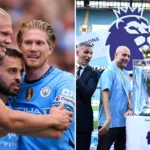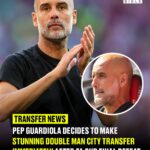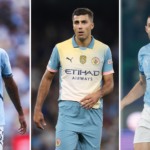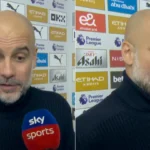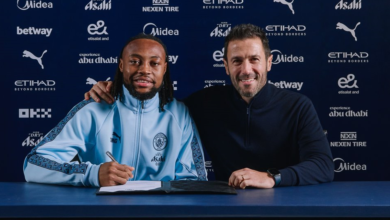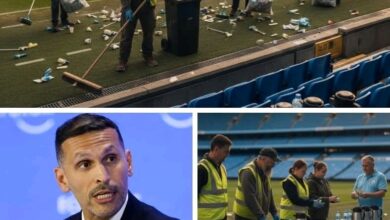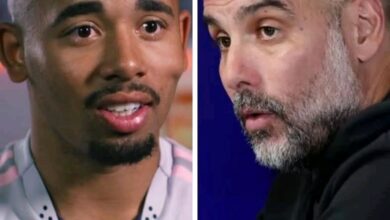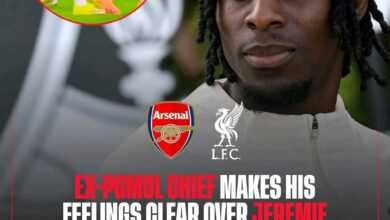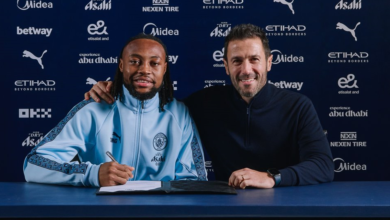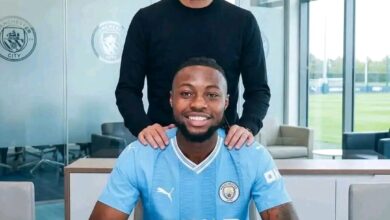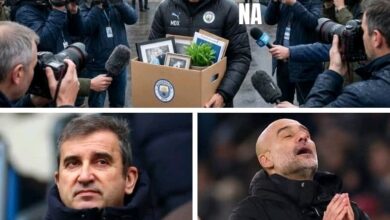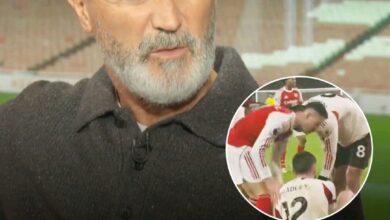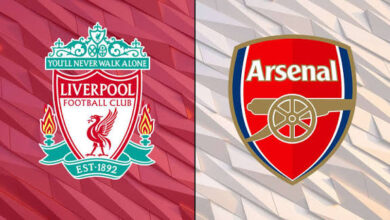Manchester City’s journey to Goodison Park on Saturday afternoon represents far more than just another fixture
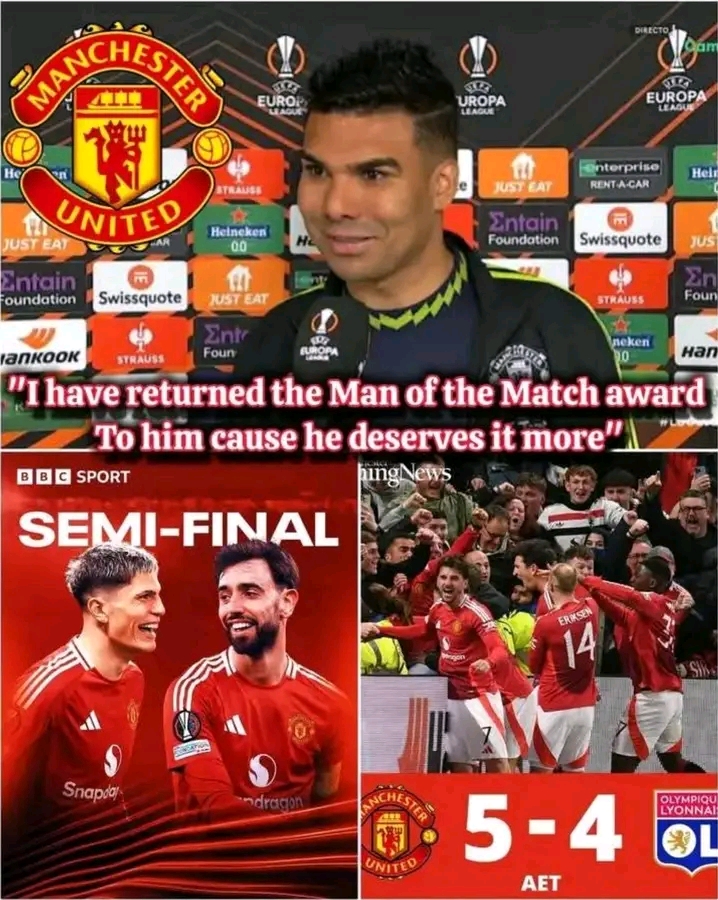
In the ever-fluctuating landscape of this Premier League season, Manchester City’s journey to Goodison Park on Saturday afternoon represents far more than just another fixture. For Pep Guardiola’s uncharacteristically vulnerable side, this match embodies their renewed quest for Champions League qualification following a campaign marked by unprecedented inconsistency. After last weekend’s dramatic 5-2 comeback victory over Crystal Palace, the blue half of Manchester glimpsed tantalizing echoes of their dominant selves—a version that has been conspicuously absent throughout much of this challenging season.
The irony hasn’t been lost on football observers: the team that secured a historic treble last season now finds itself scrapping for top-four relevancy. This dramatic decline has transformed routine fixtures like Everton away into potentially season-defining moments. The Cityzens’ inconsistency has been their Achilles’ heel, with dazzling performances frequently followed by bewildering capitulations—a pattern Guardiola desperately needs to break at Goodison Park.
“We cannot afford another setback,” Guardiola acknowledged in his pre-match press conference. “The Crystal Palace victory showed what we’re capable of, but true champions demonstrate consistency, not isolated brilliance.” This Saturday’s clash carries heightened significance given City’s struggles on the road this season. While the Etihad has remained something of a fortress, their away form has contributed significantly to their precarious league position. Against an Everton side renowned for their resolute defensive structure under Sean Dyche, City’s creativity and patience will face a stern examination
Manchester City’s medical department has been working overtime throughout this campaign, with the defensive unit bearing the brunt of their injury crisis. The latest casualty, Brazilian goalkeeper Ederson, limped off against Palace after supplying his fourth assist of the season—a remarkable statistic highlighting his importance to City’s build-up play. His absence forces Stefan Ortega into the starting lineup, a capable deputy but one who lacks Ederson’s extraordinary distribution skills. The center-back partnership represents another significant concern. With John Stones, Nathan Ake, and Manuel Akanji all sidelined, Guardiola has been forced to recalibrate his defensive structure. Josko Gvardiol, primarily deployed at left-back since his £77 million arrival from RB Leipzig, has shifted to his natural center-half position alongside the ever-reliable Ruben Dias. While Gvardiol excelled in central defense during his time in Germany, his adaptation to Premier League intensity in this position remains a work in progress.
Perhaps most intriguing has been the emergence of academy product Nico O’Reilly at left-back—a position entirely foreign to the natural midfielder. His performances have exemplified the technical versatility that characterizes City’s academy graduates, with his forward bursts and creative crossing providing unexpected attacking dimensions. Against Everton’s disciplined defensive shape, his ability to create overloads could prove invaluable. “O’Reilly represents what our academy philosophy is all about,” Guardiola explained. “Technical adaptability, tactical intelligence, and courage to express himself regardless of position. His emergence has been a rare positive during our injury difficulties.”
The prolonged absence of Rodri, arguably the world’s finest defensive midfielder when fit, has forced City to recalibrate their engine room. The Spaniard’s metronomic passing, positional excellence, and defensive awareness have proven impossible to replicate through a single replacement. Instead, Guardiola has adopted a dual pivot approach with Mateo Kovacic paired alongside winter acquisition Nico Gonzalez.
Kovacic’s renaissance continued against Palace with a thunderous 20-yard strike completing City’s comeback. The Croatian has evolved into a more dynamic, box-to-box presence in Rodri’s absence, utilizing his exceptional close control and progressive carrying to advance City through opposition pressing structures. However, his tendency to roam occasionally leaves defensive vulnerabilities that Everton’s counter-attacking specialists might exploit.
Gonzalez, secured in January from Barcelona, represents City’s long-term succession planning for Rodri’s position. The 23-year-old Spanish international has shown flashes of his considerable potential without yet displaying the commanding presence his compatriot brings. At Goodison, his positional discipline will be paramount, particularly in transitions when Everton look to break quickly through Dominic Calvert-Lewin and the fleet-footed Dwight McNeil.
“Adapting to Premier League intensity without sacrificing technical quality takes time,” former City captain Ilkay Gundogan noted when analyzing Gonzalez’s adaptation. “The spaces disappear quicker, the physical contact is stronger, and decision-making must accelerate. We saw similar adjustment periods with Rodri himself and even Bernardo Silva.”
At the heart of City’s attacking resurgence against Palace was Kevin De Bruyne’s masterful performance. The Belgian architect, whose season has been disrupted by recurring muscle injuries, displayed his sublime creative abilities with a goal and assist. His diagonal passing, in particular, carved open Palace’s defensive structure repeatedly—a weapon that could prove decisive against Everton’s compact block.
De Bruyne’s intelligent movement between lines creates the spatial chaos in which City’s attack thrives. Operating in a slightly advanced role behind the striker, his connection with Omar Marmoush has developed intriguing chemistry in recent weeks. The Egyptian forward, whose clinical finishing has yielded six Premier League goals—all at the Etihad—needs to translate this home form to away fixtures if City are to maximize their attacking potential.
“Kevin sees passes before others even recognize the possibility,” Marmoush admitted after the Palace victory. “My movement must match his vision—arriving exactly when and where the ball does. That understanding comes through practice and instinct.”
Accompanying this central attacking axis, City’s wide options reflect an intriguing blend of youth and dynamism. James McAtee, another academy graduate flourishing amid City’s injury crisis, demonstrated his finishing prowess against Palace with a composed rounding of the goalkeeper for City’s fourth goal. His intelligent movement and technical security have impressed Guardiola, potentially earning him consecutive starts despite the Catalan’s notorious rotation policy.
On the opposite flank, Brazilian sensation Savinho offers explosive acceleration and mesmerizing close control—attributes that could prove critical against Everton’s disciplined defensive block. His directness contrasts with City’s typically patient possession approach, providing an unpredictable element capable of destabilizing even the most organized defenses.
Guardiola’s tactical preparation will center on breaking down Everton’s anticipated low block—a defensive structure that has frustrated City in previous encounters. Everton’s physicality and aerial prowess, particularly from set-pieces, present additional concerns for a makeshift City defense. City’s approach likely revolves around patient circulation interspersed with moments of vertical acceleration, particularly through direct carries from Savinho and quick combinations involving De Bruyne. Width becomes essential against compressed defenses, with Rico Lewis at right-back and O’Reilly on the left tasked with stretching Everton horizontally to create interior spaces.
“Against defensive blocks, circulation speed determines everything,” Guardiola explained in a recent tactical seminar. “Not just moving the ball quickly, but knowing precisely when to accelerate and when to pause. This rhythm control destabilizes defensive structures more effectively than pure speed.”
The positioning of Kovacic and Gonzalez will prove crucial, particularly in defensive transition. Without Rodri’s extraordinary recovery pace and tactical fouling expertise, City’s protection against counter-attacks has weakened considerably this season. Everton’s direct transitions toward Calvert-Lewin represent a genuine threat that requires disciplined positioning from City’s midfield duo.
Perhaps the most encouraging narrative amid City’s challenging season has been the emergence of academy talents thriving under pressure. O’Reilly and McAtee have seized unexpected opportunities, displaying the technical and tactical education that characterizes City’s youth development philosophy. Their performances challenge the narrative that City’s financial resources negate academy pathways.
“Our academy represents the club’s soul,” Guardiola insisted recently. “When physical resources become limited through injuries, human resources come to the fore. Our young players understand our positional concepts deeply because they’ve lived them throughout their development.” This integration of youth becomes particularly significant as City reportedly face unprecedented scrutiny regarding financial regulations. The ability to supplement expensive acquisitions with homegrown talent may represent not just a sporting solution but a regulatory necessity in coming seasons
Goalkeeper: Stefan Ortega – The German keeper brings reliable distribution and shot-stopping capability, though lacks Ederson’s extraordinary passing range.
Defense: Rico Lewis (RB) – Has tempered his attacking instincts recently to provide greater defensive solidity, crucial against Everton’s left-sided threats.
Ruben Dias (CB) – The defensive leader shoulders enormous responsibility organizing a makeshift backline through communication and positional excellence. Josko Gvardiol (CB) – Reverts to his natural center-back position where his progressive passing and recovery pace offer different dimensions to City’s build-up.
Nico O’Reilly (LB) – The academy graduate continues his remarkable adaptation to an unfamiliar role, providing creativity and technical security.
Midfield: Mateo Kovacic (DM) – Brings energy, progressive carrying and box-threat from deep positions, though must maintain positional discipline.
Nico Gonzalez (DM) – Still adapting to Premier League intensity while developing his understanding of Guardiola’s complex positional demands.
Attack: James McAtee (RW) – The academy product’s intelligent movement and composed finishing have earned consecutive starting opportunities.
Kevin De Bruyne (AM) – City’s creative heartbeat whose diagonal passing and between-line positioning remains their primary attacking catalyst. Savinho (LW) – Explosive acceleration and direct dribbling provide unpredictable dimensions against organized defensive structures. Omar Marmoush (ST) – Clinical finishing at the Etihad must now translate to away performances as he leads the line in Haaland’s absence.
As City enter the final quarter of this turbulent Premier League campaign, their Champions League qualification remains precariously balanced. Traditional expectations of title challenges have been replaced by the sobering reality of securing top-four status—a remarkable recalibration for a club that has dominated English football over the past decade.
“Reaching the Champions League remains our absolute priority,” Guardiola emphasized. “This club’s identity is now intrinsically linked to European competition. Missing out would represent failure regardless of mitigating circumstances.” The psychological dimension cannot be overlooked. City’s players, accustomed to competing for multiple trophies deep into seasons, find themselves in unfamiliar territory. The pressure of potential Champions League absence looms large, particularly for a squad assembled specifically for elite European competition.
Victory at Goodison would provide crucial momentum ahead of a challenging run-in. Yet City’s inconsistency this season suggests nothing can be taken for granted—even against mid-table opposition. The spectacular comeback against Palace offered glimpses of their championship DNA, but Guardiola demands sustained performance rather than isolated brilliance. “Great teams are defined not by occasional excellence but consistent quality,” the Catalan philosopher remarked. “Our standards haven’t changed despite circumstances. Every match now represents a final in our quest for Champions League qualification.”
For Manchester City, the journey to Goodison Park represents another chapter in their quest for redemption and renewal. With youth emerging, stars returning to form, and tactical adaptations evolving, Guardiola’s men seek to transform adversity into opportunity—beginning with securing three vital points on Merseyside this Saturday afternoon.
